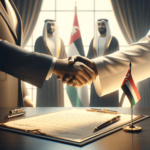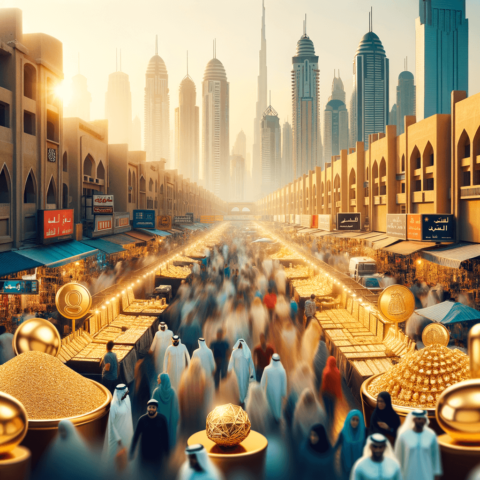
Flying High: flydubai Celebrates Three Successful Years of Connecting Dubai and Salzburg
July 19, 2024
UAE and Mauritius Sign Historic Comprehensive Economic Partnership Agreement
July 22, 2024Dubai, a city renowned for its luxurious experiences, is also a global gold trading powerhouse. Explore the latest gold rates and understand the market dynamics that make Dubai a preferred destination for tourists and investors alike.
Current Gold Rates in UAE
As of 22nd July 2024, the gold market in the UAE is experiencing dynamic fluctuations that garner significant interest from both tourists and investors. The latest gold rates are meticulously tracked and reported, with 24K gold priced at AED 233.75 per gram, 22K gold at AED 220.25 per gram, 21K gold at AED 210.50 per gram, and 18K gold at AED 180.25 per gram. These rates are instrumental for individuals seeking to buy or invest in gold due to their reflection of the current economic realities and global market trends.
For tourists, Dubai’s gold souks offer an enthralling blend of cultural experience and investment opportunity. The city’s reputation for competitive pricing and high-quality gold attracts visitors eager to both explore and purchase. The transparency in pricing and the availability of a range of carat values make it convenient for tourists to make informed decisions based on their budget and preference. The relatively lower premium on gold compared to other regions makes Dubai an attractive spot for personal and investment purchases.
Investors, on the other hand, view these rates as critical indicators within the broader gold market. The diverse options across different carat values allow for strategic investments depending on market predictions and personal strategies. 24K gold, being the purest form, is a favorite among investors keen on long-term asset security. Meanwhile, the slightly less pure variants like 22K, 21K, and 18K offer balanced opportunities for trade and aesthetic preferences, catering to a wide spectrum of market participants.
Dubai’s bustling gold trade is thus buoyed by its competitive gold rates, ensuring constant influx of visitors and steady market activity, reinforcing the city’s position as a core hub for gold transactions.
Dubai: The Global Gold Hub
Dubai sits at the confluence of the global gold trade, and its reputation as a central hub is undeniable. This stature is largely due to the emirate’s strategic geographic location, acting as a pivotal point between the gold-rich regions of Africa and the consumer-heavy markets in Asia, Europe, and North America. The city’s well-planned infrastructure and state-of-the-art logistics make it a seamless transit point for gold, ensuring efficient and secure transactions across borders.
Supporting Dubai’s role in the gold market is an array of governmental policies tailored to foster a thriving gold trade. The Dubai Multi Commodities Centre (DMCC) offers a regulatory landscape that ensures transparency and integrity, attracting international bullion traders and investors. Additionally, policies like the zero import duty on gold bars significantly reduce transaction costs, making Dubai an attractive destination for gold trade.
Key global markets like India, Switzerland, and the USA all have a stake in Dubai’s gold ecosystem. India’s cultural and economic connection to gold drives significant demand, making Dubai a crucial supplier due to its proximity and favorable trade terms. Switzerland, known for its precision in refining and trading, often routes its gold through Dubai’s refining facilities before it reaches other parts of the world. The USA, a major consumer and investor in gold, also engages significantly with Dubai, capitalizing on the city’s efficient trading system and robust security measures.
Dubai’s marketplaces, especially the Gold Souk, serve as bustling confluences of these global trade dynamics. Here, tourists and investors alike can access some of the world’s most competitive gold rates and an extensive variety of gold jewelry and bullion, further solidifying Dubai’s status as the global gold hub. This intricate web of strategic advantages, policy support, and international collaboration ensures that Dubai remains at the heart of the global gold trade.
Supply and Demand Dynamics in Dubai’s Gold Market
In Dubai’s bustling gold market, the dynamics of supply and demand are pivotal to its operation, aligning with the city’s status as a global trading hub. The supply side primarily hinges on two key sources: domestic production and substantial imports. While the UAE itself has limited gold mining activities, it compensates for this through massive imports from gold-rich regions such as Africa and Europe. Imports from countries like Ghana, South Africa, Switzerland, and the United Kingdom fortify Dubai’s gold reserves, meeting its hefty market demand.
These imports are instrumental in sustaining the city’s gold supply, ensuring there’s always enough gold flowing through its market to cater to diverse consumer needs. The demand in Dubai’s gold market is driven by three main sectors: consumer purchases of jewelry, institutional investors, and banks. Visitors flocking to Dubai are lured by the allure of exquisite, high-quality jewelry, which remains a popular choice for tourists seeking luxury.
Meanwhile, institutional investors, including hedge funds and private equity firms, view gold as a robust hedge against market volatility. Their investment strategies frequently include significant allocations to physical and digital gold. Additionally, banks play a crucial role in driving demand by holding substantial reserves of gold to diversify asset portfolios and enhance financial stability.
This intricate balance between a reliable supply chain and diverse demand spectrum underpins Dubai’s dynamic gold market, bolstering its international repute as the ‘City of Gold’.
Future Trajectories of the Gold Market in UAE
Beneath its glittering exterior of bustling souks and luxury boutiques, Dubai’s gold market is continuously shaped by numerous global and regional factors. One of the major considerations is the fluctuation in oil prices. As the UAE’s economy is significantly oil-dependent, swings in oil prices can lead to broader economic ripple effects, impacting consumer purchasing power and investment trends in gold. When oil prices are high, Middle Eastern economies, particularly the Gulf states, experience liquidity surges that often translate into increased gold purchases as a store of wealth.
Global economic growth concerns further complicate the picture. Economic slowdowns or uncertainties in major markets like the United States, China, and the European Union can drive international investors towards safer havens like gold. This flight to safety can elevate gold prices, hence drawing more trading activity into hubs like Dubai. Conversely, robust global economic growth may divert investments into other sectors, potentially dampening the demand for gold.
Additionally, the shift from physical to digital gold investments is rapidly gaining traction. Digital gold platforms, which allow for the trading and holding of gold without the need for physical storage, are becoming increasingly popular among tech-savvy investors. This progression may influence the physical gold market in Dubai. However, Dubai’s status as a premier gold trading hub is unlikely to wane, as the Emirate adapts by integrating more digital infrastructure into its already advanced trading ecosystem.
These factors create a dynamic and intricate landscape for Dubai’s gold market. With oil prices in constant flux, unpredictable global economic conditions, and technological advancements shaping investment methods, Dubai is poised to remain a crucial junction for gold trading—balancing tradition with innovation.
Understanding Carats and Gold Alloys
Understanding gold’s purity, particularly when measured in carats (or karats), is vital for both jewelry buyers and investors navigating Dubai’s glittering market. The most common denominations you’ll encounter are 24K, 22K, 21K, 18K, 14K, and 9K, each representing a different level of purity and utility.
Pure gold, denoted as 24K, stands at 99.9% purity. This level of gold is highly prized for its quality but is also notably soft and malleable, making it less ideal for intricate jewelry designs requiring durability. In contrast, 22K gold consists of approximately 91.6% gold mixed with other metals like copper or silver, offering a balance of purity and increased sturdiness. This makes it a favored choice for high-end jewelry that retains a rich gold hue but provides enhanced strength.
The distinctions continue with 21K gold, which contains about 87.5% pure gold, maintaining a luxury appearance while being more adaptable for various forms of jewelry. 18K gold, composed of 75% gold, strikes a popular compromise between purity and practicality, being significantly harder and more scratch-resistant, making it ideal for everyday wear.
14K gold, with about 58.5% purity, and 9K gold, comprising approximately 37.5% gold, are even more mixed with other metals, which increases their longevity and reduces costs. Though less expensive and not as rich in color, they offer elegant options for buyers focused on durability and affordability.
Understanding these differences is crucial for tourists and investors in Dubai. For buyers, it means making informed choices about the durability and appearance of the jewelry they purchase. For investors, recognizing gold purity can influence decisions based on market value and potential returns. By discerning these finer points, one can navigate Dubai’s sparkling gold market with confidence and clarity.
Tourism and Gold: A Perfect Blend in Dubai
For tourists visiting Dubai, the allure of the city’s majestic architecture, luxurious lifestyle, and vibrant culture is undeniable, making it a premier destination. However, one cannot overlook the magnetic pull of Dubai’s thriving gold market. The shimmering gold souks, ornate showrooms, and innovative gold-themed tours cater to tourists seeking both opulence and investment opportunities, merging the worlds of travel and treasure seamlessly.
Shopping in Dubai’s famous gold souks offers an immersive experience where tradition meets extravagance. The Gold Souk in Deira, with its labyrinth of shops, is a must-visit for visitors eager to witness an array of gold jewelry ranging from intricate traditional pieces to contemporary designs. The souk’s lively environment, coupled with a plethora of choices, ensures tourists find the perfect memento to commemorate their visit.
Many tourists are also drawn to specialized gold tours, which provide an in-depth look at Dubai’s gold industry. These tours often feature visits to gold refineries, workshops where skilled artisans craft stunning pieces, and exclusive showrooms that showcase high-end gold collections.
Dubai’s tax-free status on gold purchases further adds to its appeal for international visitors looking to invest. However, it’s crucial for tourists to be well-informed about the gold market. They should familiarize themselves with current gold rates and trends, and seek reputable dealers to ensure a smart investment.
Negotiation is also customary in Dubai’s gold market, allowing travelers to secure competitive prices. Tourists are advised to compare prices across different shops and conduct thorough research. Combining sightseeing with gold shopping not only enriches the travel experience but also presents unique opportunities for investment, making Dubai a gold enthusiast’s paradise.
Conclusions
Dubai’s gold market continues to flourish, attracting tourists and investors with its dynamic rates, strategic trade practices, and luxurious experiences. Understanding current rates, market dynamics, and future trends equips visitors with the knowledge to make informed decisions, blending tourism with lucrative investment opportunities in the heart of Dubai.





